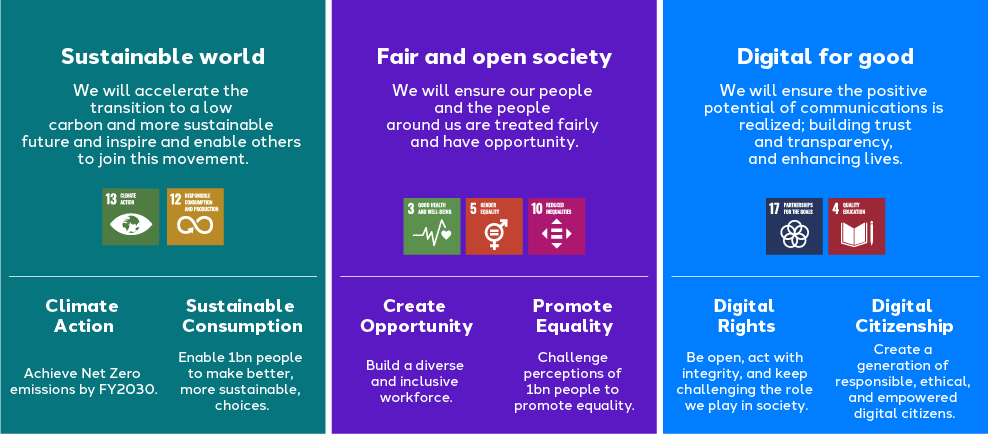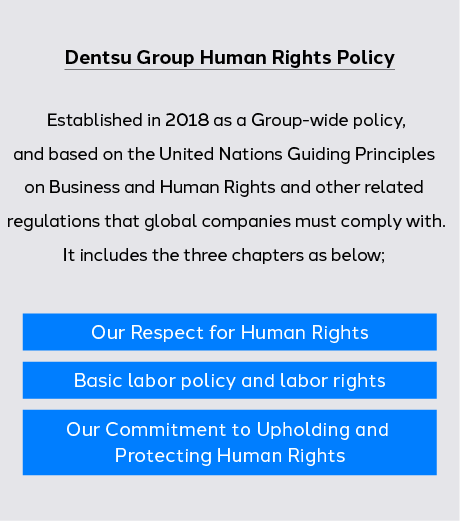2030 Sustainability Strategy
In 2021, we launched our 2030 Sustainability Strategy, created through deep engagement with our stakeholders and an understanding of our material issues as a company and an industry. Our priority focus areas—climate action, sustainable consumption, diversity and inclusion, responsible media and trust—continue to resonate.

Sustainable world
We made strong progress in our decarbonization efforts during 2021, reducing our Scope 1 and 2 emissions by 29.0% against our FY2019 baseline, and by 10.6% compared to FY2020. In FY2021, our market-based Scope 1 and 2 emissions were 24,103 tons of CO2 equivalent (tCO2e), compared to 26,955 tCO2e in FY2020 and 33,962 tCO2e in FY2019. The reduction was in part due to remote working, but these reductions can be largely attributed to our ongoing commitment to power our operations with 100% renewable electricity, including continued efforts to switch to local renewable tariffs and to procure in-country renewable electricity certificates. Our international operations continue to be powered by 100% renewable electricity, maintaining RE100 status.
Our Scope 3 emissions against our FY2019 baseline associated with business travel reduced by 87.5%. We also reduced water by 85.1%, waste by 3.1% and paper by 67.5%.
In November 2021, COP26 delegates reminded the world that the window to meet the Paris Agreement goals is closing. The conference was the first time that climate pledges made under the 2015 Paris Agreement were revisited, and resulted in nearly 200 countries supporting the Glasgow Climate Pact, agreeing to cut emissions to prevent going beyond 1.5°C.
Dentsu Group has responded by increasing our level of ambition, setting a deep decarbonization target by 2040 for the international business, which became one of the first companies in the world to have a net-zero target approved. This external validation by The Science Based Target initiative (SBTi) under their new Net-Zero Standard creates transparency around our commitment and plans.
In the lead-up to COP26 and throughout the conference, we advocated for change across business and society. With the Dentsu International Global CEO Wendy Clark in attendance, we supported direct calls to action and deepened our engagement with leading stakeholders and industry efforts like the World Economic Forum and the We Mean Business Coalition. As members of the World Business Council For Sustainable Development (WBCSD), we were also proud to sign the WBCSD Business Manifesto for Climate Recovery. The Manifesto sets out 12 action priorities framed around reducing, removing and reporting emissions, and highlights the importance of public–private collaboration in driving climate action. We were one of 108 members to sign the Manifesto, which inspired the world’s most sustainable and ambitious businesses to use their collective voice to accelerate the global climate recovery.
We continue to promote sustainable consumption and production, recognizing the unique opportunity we have to influence human and societal behaviors. To coincide with the COP26 Youth Summit we launched our first global “Rise Up” challenge, calling for young people all over the world to create campaigns, in collaboration with our clients, to combat food waste, a significant contributor to greenhouse gas emissions.
This integral part of our 2030 Sustainability Strategy was reinforced in April 2022 with the publication of the Intergovernmental Panel on Climate Change (IPCC) report, which included for the first time a chapter on demand-side mitigation citing the opportunity to reduce global carbon emissions by 40–70% by creating consumer demand for climate- friendly products and services, including electric vehicles and plant-based food. We expect this aspect of our strategy to become increasingly important in the future.
In 2022, we will implement Salesforce Net Zero Cloud, a data-monitoring system that will give us real-time data on our carbon footprint, further increasing transparency and informing our decarbonization plans.
Fair and open society
The pandemic continued to impact people all over the world throughout 2021. New variants, different lockdowns and varied recovery plans resulted in uneven recoveries for both countries and different communities within them. This exacerbated pre-existing inequalities, particularly for women and ethnic minorities. Throughout the year, we continued to find ways to address inclusion and empowerment within dentsu and beyond.
We have made significant efforts to embed a greater understanding of diversity and cultural fluency across the business. The success of our efforts was reflected in our improved employee engagement scores and progress toward our goals. We achieved 12.8% female representation in our senior management team in Japan, and 34.0% in our international business. Signing up to both the United Nation’s (UN’s) Women’s Empowerment Principles and UN Global Compact Target Gender Equality has further strengthened our support for gender equality. Recognizing the importance of progressing representation beyond gender, in the US and Canada we set a new goal to achieve 30% BIPOC by FY2025.

In Japan, to commemorate the tenth-year anniversary of our web medium “cococolour” that addresses social issues related to Diversity, Equity & Inclusion (DE&I), the team is expanding its field. In 2022, the team has so far introduced an online event “DJN DE&I WEEK” for the people from inside and outside of Dentsu Japan Network (DJN) to exchange their knowledge and experiences, as well as “cococolor journey,” a workshop-style DE&I solution for our clients.
We are proud to achieve a perfect score of 100 in the Human Rights Campaign Foundation 2022 Corporate Equality Index. DE&I remains a board-level priority for the Group.
We continue to align our work to the UN Sustainable Development Goals (SDGs), promoting equality with a central focus on SDG 5: Gender Equality and SDG 10: Reduced Inequalities. Our goal is to reach one billion people with campaigns that challenge perceptions and stereotypes by 2030, and in 2021 we made great progress, reaching over 200 million people. Our work focused on issues including violence against women, women’s empowerment and equality for all regardless of sex, gender, disability and race.
We are honored to have won accolades for our campaigns, further raising awareness of these important issues, including a Cannes Lions Silver for Roadside Markets, a Mastercard campaign that promotes equal access to market for small vendors across Romania. In Latin America, our creative agency Isobar Argentina took home the Grand Prix and two gold medals for Best Creative Campaign and Best Campaign for Social Good at ECHO Latam for Hits Que Duelen, a campaign with FENA, an Argentinian NPO addressing sexist and misogynistic language in music. Campaign Asia recognized our gender violence campaign for RainLily, a non-government organization in Hong Kong, naming it one of the top five applause-worthy ads across Asia Pacific in 2021.
At the same time, we continued our work to address the underlying issues exacerbating inequality including health and wellbeing, an issue which remains in the global spotlight. As COVID-19 continued into its second year, dentsu teams around the world partnered to deploy their skills and tools to ensure vaccine equity and access for all, reaching 370 million people through campaigns in the fight against COVID. We were also proud to continue our pro bono support of non-profit Malaria No More, with the successful launch of “Draw The Line” against malaria, reaching over 440 million people across 52 African countries in the first six months alone. The campaign has since won multiple awards, claiming both the Grand Prix and Social Good accolades at the World Media Awards 2021. In 2022 we are continuing our support, driving awareness and advocacy in the run up to the Commonwealth Heads of Government meeting in Rwanda. Our work to empower people to call for improved healthcare and prevention of infectious disease has collectively reached over 800 million people, far surpassing our initial goal of 250 million people.
Digital for good
Since global lockdowns began, more people are living their lives online. At the same time, the internet is enabling increased levels of misinformation while the privacy and digital wellbeing of users remain under threat. We continue to collaborate across industry with organizations such as the Global Alliance for Responsible Media to make the digital world a safer place for users. We also believe that everyone, especially youth from disadvantaged communities, should be given the skills to be active and informed digital citizens.
Our ambition is to use our global reach and expertise to support 100,000 young people to become empowered digital citizens by FY2030. We will deliver this through our global flagship school program, The Code, in collaboration with a network of education providers, and university partnerships.
We continue to make good progress toward our target, despite disruptions caused by COVID-19 and school closures. In 2021, we reached over 12,000 young people across our global network. Of these, over 6,300 young people were supported through The Code, and approximately 6,000 through other local education initiatives, such as Merkle’s partnership with Howard University in the United States.
In recognition of the need for online support during continued lockdowns and educational disruption, and with the support of UK delivery partner MyKindaFuture, we expanded access to our The Code curriculum on the remote learning Connectr platform to all young people globally. In addition to the core ten modules, we launched three new Code digital modules on ethics, social media and food waste, developed by dentsu subject matter experts volunteering their time and expertise.